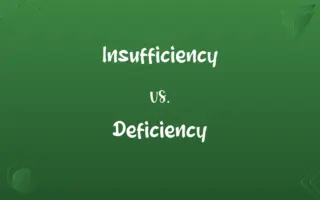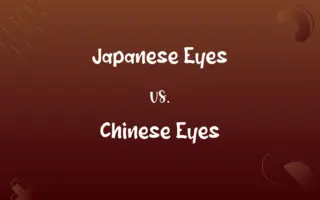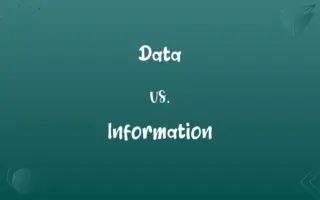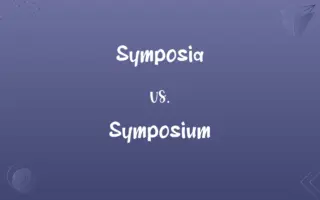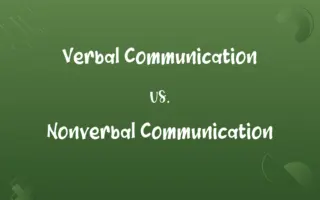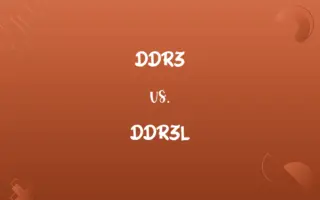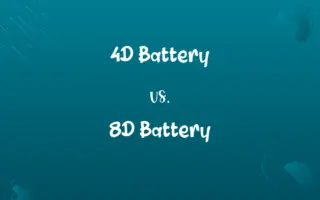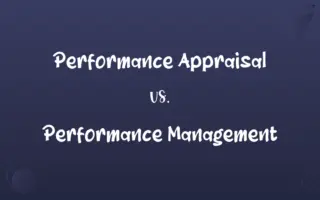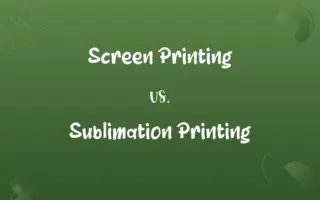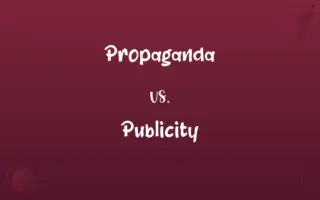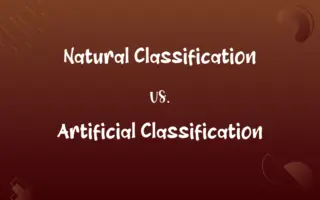Disproportionately vs. Disproportionally: Know the Difference

By Shumaila Saeed & Dua Fatima || Updated on March 5, 2024
"Disproportionately" means to an extent that is too large or too small in comparison to something else, whereas "disproportionally" often serves as its less common variant with similar meaning.
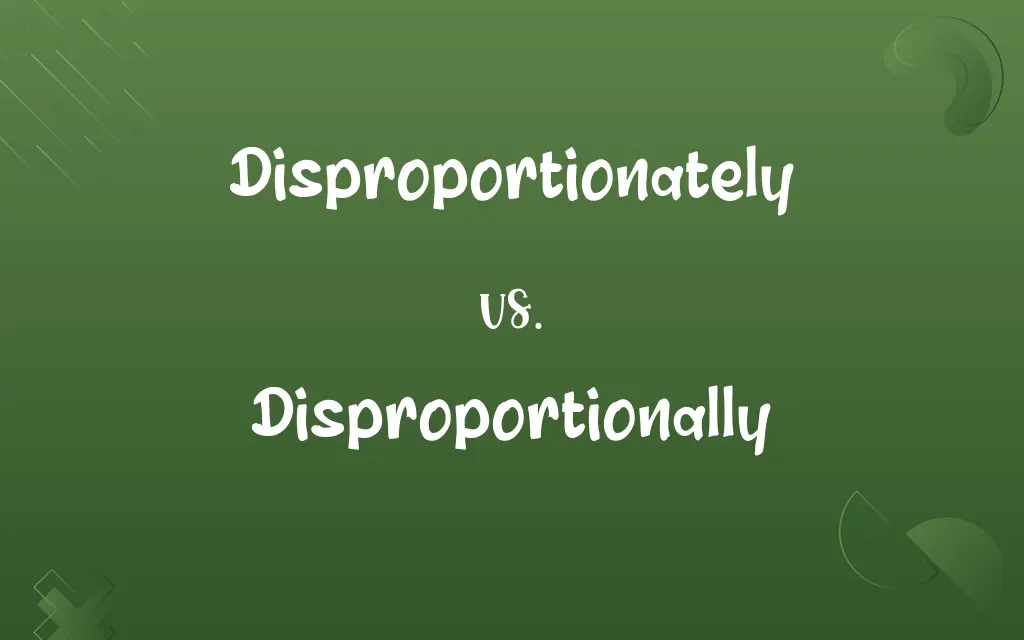
Key Differences
"Disproportionately" is frequently used to describe something that is out of proportion in size, amount, or degree relative to something else. It implies an imbalance or inequity in the way something is distributed or appears. On the other hand, "disproportionally" conveys a similar meaning but is less commonly used in everyday language. Both terms are employed to express that something does not match or fit properly in proportion, but "disproportionately" is more prevalent in written and spoken English.
Shumaila Saeed
Mar 05, 2024
While "disproportionately" is often chosen for its familiarity and ease of pronunciation, "disproportionally" can be found in various texts and contexts, suggesting that the choice between them may sometimes be stylistic. However, the preference for "disproportionately" in formal writing and communication underscores its broader acceptance and usage. Conversely, "disproportionally" might be seen as a more technical or specialized variant, though it does not convey a significantly different meaning.
Shumaila Saeed
Mar 05, 2024
In discussions of social, economic, or environmental issues, "disproportionately" is commonly used to highlight imbalances that affect certain groups more than others. For example, discussing how pollution disproportionately affects lower-income communities emphasizes the unequal burden they bear. "Disproportionally," while equally valid in this context, is less frequently chosen, possibly due to its lower recognition and usage among the general public.
Shumaila Saeed
Mar 05, 2024
The nuances between "disproportionately" and "disproportionally" are subtle, and their interchangeability in many contexts does not generally lead to confusion. The choice between them might reflect an author's or speaker's preference for language that aligns with their audience's familiarity or the conventions of their field. Despite this, the dominance of "disproportionately" suggests it is the preferred term for conveying concepts of disproportion in a wide range of discussions.
Dua Fatima
Mar 05, 2024
Both terms highlight issues of balance and fairness, with their use often calling attention to areas in need of scrutiny or correction. Whether discussing the disproportionate representation of certain groups in media or the disproportionate effects of climate change, the choice of term does not diminish the importance of the issue being addressed. The key difference lies in usage patterns rather than in meaning, with "disproportionately" standing as the more commonly selected word in discussions that aim to reach a broad audience.
Dua Fatima
Mar 05, 2024
ADVERTISEMENT
Comparison Chart
Meaning
To an extent that is too large or too small in comparison.
Similar to disproportionately, indicating an imbalance.
Shumaila Saeed
Mar 05, 2024
Usage Frequency
More commonly used in both spoken and written English.
Less commonly used, with a more technical or formal tone.
Dua Fatima
Mar 05, 2024
Context
Widely used across various contexts.
Used interchangeably with disproportionately in many contexts.
Shumaila Saeed
Mar 05, 2024
Nuance and Preference
Preferred for its familiarity and ease of understanding.
Sometimes chosen for stylistic reasons or field conventions.
Hifza Nasir
Mar 05, 2024
Example Contexts
Social, economic, environmental issues highlighting imbalances.
Similar contexts as disproportionately, but less preferred.
Hifza Nasir
Mar 05, 2024
ADVERTISEMENT
Disproportionately and Disproportionally Definitions
Disproportionately
In a way that is out of proportion with something else.
The disease affects older individuals disproportionately.
Dua Fatima
Mar 05, 2024
Disproportionally
In an imbalanced or uneven manner, similar to disproportionately.
Funding is allocated disproportionally, favoring certain areas over others.
Shumaila Saeed
Mar 05, 2024
Disproportionately
Beyond what is usual in comparison to something else.
Small businesses have been disproportionately impacted by the pandemic.
Shumaila Saeed
Mar 05, 2024
Disproportionally
To an extent that lacks proportion with something else.
Disproportionally high rates of unemployment are observed in some communities.
Shumaila Saeed
Mar 05, 2024
Disproportionately
To a much larger or smaller extent than is fair or equal.
Wealth is disproportionately concentrated in the hands of a few.
Shumaila Saeed
Mar 05, 2024
ADVERTISEMENT
Disproportionally
Indicating an inequity or imbalance.
Access to healthcare is disproportionally limited for certain populations.
Shumaila Saeed
Mar 05, 2024
Disproportionately
Significantly uneven or imbalanced.
Certain regions are disproportionately affected by climate change.
Hifza Nasir
Mar 05, 2024
Disproportionally
Reflecting a significant difference in size, amount, or intensity.
Pollution levels are disproportionally higher in industrial zones.
Dua Fatima
Mar 05, 2024
Disproportionately
In an unequal or inequitable manner.
Resources are distributed disproportionately among different groups.
Hifza Nasir
Mar 05, 2024
Disproportionally
Beyond the expected or usual proportion.
Some students are disproportionally affected by changes in education policy.
Hifza Nasir
Mar 05, 2024
Disproportionally
In a disproportional manner, or to a disproportional extent; disproportionately
Shumaila Saeed
Oct 19, 2023
Repeatedly Asked Queries
Is there any context where one term is significantly more appropriate than the other?
Not typically; the choice between them is more about preference and frequency of use than about appropriateness in specific contexts.
Dua Fatima
Mar 05, 2024
Are "disproportionately" and "disproportionally" interchangeable?
Yes, they are often used interchangeably, though "disproportionately" is more common.
Dua Fatima
Mar 05, 2024
Can the choice between these terms affect the clarity of communication?
No, the choice between these terms does not significantly impact clarity, as their meanings are very similar.
Shumaila Saeed
Mar 05, 2024
Which term is preferred in academic writing?
"Disproportionately" is generally preferred due to its more widespread acceptance and usage.
Shumaila Saeed
Mar 05, 2024
How do these terms relate to discussions of equity and fairness?
They are often used to highlight imbalances that contribute to inequity and unfairness in various contexts.
Shumaila Saeed
Mar 05, 2024
Is one term more modern than the other?
Both terms have been in use for a long time, though "disproportionately" may be seen as more contemporary due to its higher frequency of use.
Dua Fatima
Mar 05, 2024
How do these terms contribute to analytical discussions?
They are crucial for describing and analyzing imbalances and disproportions in research and discussions across fields.
Shumaila Saeed
Mar 05, 2024
What is the impact of using these terms in social justice discussions?
They help quantify and articulate imbalances affecting marginalized groups, guiding focus and resources to address these issues.
Dua Fatima
Mar 05, 2024
Can using these terms help identify areas for policy intervention?
Yes, highlighting disproportionate effects can draw attention to areas needing policy changes or interventions.
Shumaila Saeed
Mar 05, 2024
Why might someone choose "disproportionally" over "disproportionately"?
The choice might be stylistic or reflect the conventions of a specific field or discipline.
Hifza Nasir
Mar 05, 2024
How does the usage of these terms vary in non-English languages?
The concept may be expressed differently, depending on the language's structure and vocabulary for describing proportions and imbalances.
Hifza Nasir
Mar 05, 2024
Are these terms used differently in different English-speaking regions?
Usage patterns may vary slightly, but the distinction between them remains subtle across different forms of English.
Dua Fatima
Mar 05, 2024
Can understanding the difference between these terms improve communication skills?
Yes, recognizing their interchangeability and nuances can enhance precision in language use.
Shumaila Saeed
Mar 05, 2024
Do these terms have synonyms that are frequently used?
Terms like "unevenly" or "unequally" can serve similar purposes but might not capture the specific connotations of proportionality.
Shumaila Saeed
Mar 05, 2024
Share this page
Link for your blog / website
HTML
Link to share via messenger
About Author
Written by
Shumaila SaeedShumaila Saeed, an expert content creator with 6 years of experience, specializes in distilling complex topics into easily digestible comparisons, shining a light on the nuances that both inform and educate readers with clarity and accuracy.
Co-written by
Dua Fatima